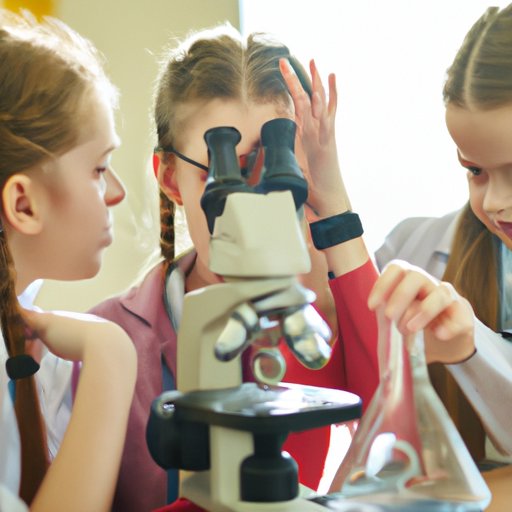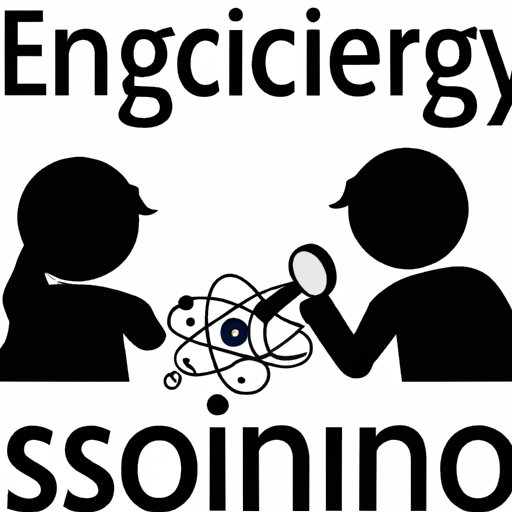Introduction
Observation is a critical part of scientific inquiry. It involves the careful and systematic examination of an event or phenomenon in order to gain information about it. Through observation, scientists are able to identify patterns, trends, and relationships that can help them to better understand the world around them. In this article, we will explore why observation is important in science and examine its role in scientific discovery.

Exploring the Role of Observation in Scientific Inquiry
Observation is essential for scientists to accurately record data and draw valid conclusions. As Nobel Prize-winning physicist Richard Feynman said, “The first principle is that you must not fool yourself, and you are the easiest person to fool.” Therefore, in order to prevent self-deception, scientists must make detailed and accurate observations. To do this, they use a variety of methods such as direct observation, interviews, surveys, and experiments.
Direct observation involves observing events or phenomena directly. This can be done in the field, in a laboratory setting, or through the use of instruments such as microscopes, telescopes, or cameras. Interviews and surveys involve asking questions to people or groups of people in order to gain information. Experiments involve manipulating variables in order to observe the effects on other variables.

Analyzing the Significance of Observation in Scientific Discoveries
Observation has played an important role in major scientific discoveries throughout history. For example, in the 17th century, Galileo Galilei used a telescope to observe the planets and moons of our solar system, leading to his discovery of the four largest moons of Jupiter. Similarly, in the 19th century, Charles Darwin used observations of animals, plants, and fossils to develop his theory of evolution by natural selection.
Observation also plays an important role in the development of new theories. By making accurate and detailed observations, scientists are able to identify patterns and relationships between different phenomena. These patterns and relationships can then be used to generate hypotheses that can be tested using experiments. If the results of the experiments support the hypotheses, then the hypotheses can be developed into theories.
Examining the Benefits of Observation for Understanding Natural Phenomena
Observation is also important for helping scientists to understand natural phenomena. By making careful and systematic observations, scientists are able to identify patterns and trends that can help them to better understand how different phenomena interact with each other. For example, by observing the behavior of birds in different environments, scientists can gain insights into how different species adapt to their surroundings.
Observation also helps scientists to identify relationships between different phenomena. For example, by observing the relationship between air temperature and precipitation, scientists can gain insights into how climate change is affecting the environment.

Evaluating the Impact of Observations on Developing Hypotheses and Theories
Observation is also important for generating hypotheses and developing theories. By making accurate and detailed observations, scientists are able to identify patterns and relationships between different phenomena. These patterns and relationships can then be used to generate hypotheses that can be tested using experiments. If the results of the experiments support the hypotheses, then the hypotheses can be developed into theories.
For example, astronomer Edwin Hubble used observations of galaxies to develop his theory of an expanding universe. Similarly, Johannes Kepler used observations of planetary motions to develop his three laws of planetary motion. Both of these theories were based on observations that led to hypotheses that were later tested and supported.
Investigating the Use of Observation in Problem-solving and Experimentation
Observation is also important for problem-solving and designing experiments. By making careful and systematic observations, scientists are able to identify patterns and trends that can help them to solve problems. For example, by observing the behavior of a particular species of insect, scientists can gain insights into how best to control its population.
Observation is also important for designing experiments. By making accurate and detailed observations, scientists are able to identify variables that can be manipulated in order to test a hypothesis. For example, by observing the relationship between air temperature and precipitation, scientists can design experiments to test the effects of climate change on the environment.
Conclusion
In conclusion, observation is an essential part of scientific inquiry. It helps scientists to accurately record data and draw valid conclusions. It also plays an important role in the development of new theories and the understanding of natural phenomena. Furthermore, it is important for problem-solving and designing experiments. Thus, observation is critical for advancing scientific knowledge and furthering our understanding of the world around us.
(Note: Is this article not meeting your expectations? Do you have knowledge or insights to share? Unlock new opportunities and expand your reach by joining our authors team. Click Registration to join us and share your expertise with our readers.)
